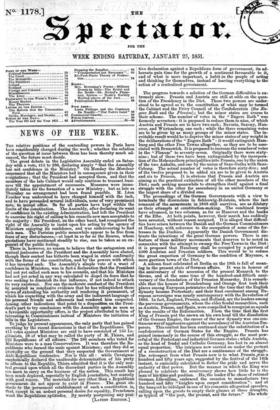NEWS OF THE WEEK.
TirE relative positions of the contending powers in Paris have been considerably changed during the week ; whether the solution of the question at issue between them has been thereby much ad- vanced, the future must decide.
The great debate in the Legislative Assembly ended on Satur-
day with a vote, 415 to 286, declaring simply "that the Assembly has not confidence in the Ministry." On Monday the Moniteur announced that all the Ministers had in consequence given in their resignations ; that the President had accepted them, and that the members of the late Cabinet would only continue to transact busi- ness till the appointment of successors. Measures were imme- diately taken for the formation of a new Ministry; but as late as Thursday no arrangement had been found possible. M. Leon Faucher was understood to have- charged himself with the task, and to have persuaded several individuals, none a very prominent note, to accept office. So far all parties have kept within the limits of the constitution. The Assembly, after declarinc,° its want of confidence in the existing Administration had left the President to exercise his right of ceiling. to his councils new men acceptable to the majority : the President, on the other hand, had recognized the right of the Assembly to insist upon his acting by the agency of Ministers enjoying its confidence, and was endeavouring to find such men. The Parisian public meanwhile appear to be free from fears of any disturbanoes,—at least in so far as the Bourse, where quotations have continued steadily to rise, can be taken as an ex- ponent of the public feeling.
There is, however, no reason to believe that the antagonism and
mutual jealousies of the President and the Assembly have abated, though their contest has hitherto been waged in strict confrmaity with the forms of the constitution, and by the powers with Which it has invested each. The Assembly's simple vote of a want of confidence in Ministers, was in fact a declaration that the President liad not yet called such men to his councils, and that his Ministers had not yet acted in any way calculated to dispel its fears that he was seeking to diminish its due influence, if not indeed to attack its very existence. Nor can the moderate conduct of the President be accepted as concluaive evidence that he has relinquished those views of extendinglis authority and rendering it permanent, of Which his coquetting with the army and the indiscreet language of his personal friends and adherents had rendered him suspected. Among other indications that point to a disposition on the Presi- dent's part to try conclusions with the Assembly again as soon as a favourable opportunity offers, is the project attributed to him of intrusting to Commissioners instead of Ministers the initiation of bills in the Legislature.
To judge by present appearances, the only party that has gained anything by the recent discussions is that of the Republicans. The 415 votes against Ministers are said to have consisted of 135 Le- gitimists, 58 of what may be called the party of M. Thiers, and 222 Republicans of all colours. The 286 members who voted for Ministers were to a man Conservatives. It was therefore the Re- publicans who turned the scale against Ministers ; and they did so aVoWedly on the ground that they suspected the Government of Anti-Republican tendencies. Nor is this all : while Cavaignac emphatically declared the unalterable determination of his party to adhere to the Republic, Thiers admitted that it is the only neu- tral ground upon which all the discordant parties in the Assembly can meet to carry on the business of the nation. This result has been much deplored, especially by English journalists, but scarcely with good reason. The materials for any other than a Republican government do not appear to exist in France. The great ob- stacle to the permanent establishment of such a constitution. is, that, except in. an ardent personal desire for equality, Frenchmen want the Republican aptitudes. By merely postponing -any pbsi=
tive declaration against a Republican form of government, its ad- herents gain time for the growth of a sentiment favourable to it, and of what is more important, a habit in the people of acting- and thinking for themselves, instead of leaving everything to the action of a centralized government.


























